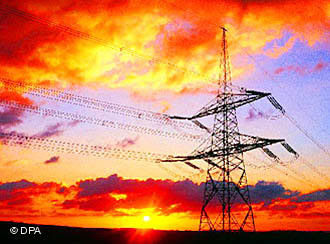
The European Commission has adopted draft legislation that would separate power generation from distribution networks. The aim is to restrict the influence of big utility companies. But not everyone is happy.
The idea behind the proposals is to keep large energy providers from exclusive control over the supply of natural gas and electricity to the European bloc.
In part, the initiative is aimed at Russia, which provides around a quarter of Europe's gas, since the proposals would ban foreign firms from owning transmission networks -- unless agreements are reached between the European Union and the companies' home countries.
But the proposals would also force utility companies within the Europea Union -- for instance, Germany's E.on or Electricite de France -- to sell off distribution networks or hand over control to an independent operator. And that has drawn mixed reactions.
Necessary reforms?
The Commission justified the proposals by saying they would boost competition and allow new operators to enter the market.
The president of Germany's Association of Energy Consumers, Aribert Peters, welcomed the initiative, saying in a radio interview that it was the only way to lower prices and to ensure a level playing field.
But both Germany and France would like to see their big utility companies retain more influence and are likely to try to negotiate compromises in the proposed legislation.
The energy spokesman for Germany's governing Christian Democratic Union, Joachim Pfeiffer, said in a radio interview that uncoupling providers from distributors was "a completely wrong path" and that previous liberalizing reforms should be given a chance to take effect.
In part, the initiative is aimed at Russia, which provides around a quarter of Europe's gas, since the proposals would ban foreign firms from owning transmission networks -- unless agreements are reached between the European Union and the companies' home countries.
But the proposals would also force utility companies within the Europea Union -- for instance, Germany's E.on or Electricite de France -- to sell off distribution networks or hand over control to an independent operator. And that has drawn mixed reactions.
Necessary reforms?
The Commission justified the proposals by saying they would boost competition and allow new operators to enter the market.
The president of Germany's Association of Energy Consumers, Aribert Peters, welcomed the initiative, saying in a radio interview that it was the only way to lower prices and to ensure a level playing field.
But both Germany and France would like to see their big utility companies retain more influence and are likely to try to negotiate compromises in the proposed legislation.
The energy spokesman for Germany's governing Christian Democratic Union, Joachim Pfeiffer, said in a radio interview that uncoupling providers from distributors was "a completely wrong path" and that previous liberalizing reforms should be given a chance to take effect.
Via| DW News
EUROPA|proteccionismo|Christian Democratic Union,BAJAENERGY TV,EDF,EON,European Union,France,Germany,protectionist policy,Russia,energyblog
EUROPA|proteccionismo|Christian Democratic Union,BAJAENERGY TV,EDF,EON,European Union,France,Germany,protectionist policy,Russia,energyblog
Found this post useful? Consider subscribing to
